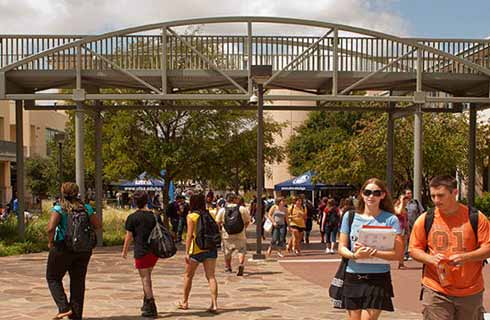MBiol(荣誉)生物科学
MBiol (Hons) Biosciences

学历文凭
Undergraduate Masters

专业院系
Biological Sciences

开学时间

课程时长

课程学费

国际学生入学条件
IDP—雅思考试联合主办方

雅思考试总分
6.5
- 雅思总分:6.5
- 托福网考总分:80
- 托福笔试总分:
- 其他语言考试:Pearson Academic PTE - 62 (with no less than 59 in each Communicative Skill) Cambridge C2 Proficiency or C1 Advanced - 176 with a minimum of 169 per component
CRICOS代码: C107
申请截止日期: 请与IDP联系 以获取详细信息。
课程简介
Satisfy your curiosity about biology with an integrated Master’s in Biosciences that will enhance your understanding of the world around you and prepare you for employment in the science sector and beyond.,With science and its challenges making today’s global headlines, studying this research-led modular degree will help you develop the necessary skills you’ll need to pursue a career in the science sector and beyond. The MBiol course offers flexibility so that you can follow specialised routes within biological sciences by offering module combinations to address your specific areas of interest. The curriculum links academic theory with practical experience through a combination of core and optional modules that offer plenty of opportunity to tailor your studies as your interests evolve. Themed ‘routes’ include Biochemistry and Molecular Biology, Biomedical Science, Cell Biology, Genetics, and Ecology and Environmental Science. In Year 1 you will study the fundamental aspects of biology and the basics of scientific research. Year 2 concentrates on providing the skills required for research-led learning. Year 3 places a strong emphasis on research, with taught content directly linked to research being carried out in the Department. Two core modules, a field course or laboratory-based workshop and a literature review, are combined with optional modules linked to your interests and career aspirations. The final year, prepares you for research at postgraduate level and includes an extended project in a biology related area. Running through most of the academic year, it allows you to gain hands-on experience working alongside academic staff doing world-leading research.Course structureYear 1 modulesCore modules:Molecules and Cells gives an overview of cells and their molecular components. It explores the structure and functions of proteins and biological membranes; cellular metabolism and energy-generating processes; and communication and signalling between cells.Genetics introduces the development of genetics and the processes linking genotype to phenotype in living organisms. It provides an overview of modern technologies for genetic analysis and manipulation.Introduction to Physiology covers mammalian physiology as a model for processes in other organisms, describing a range of tissues and processes and connecting them at a molecular and cellular level.Organisms and Environment provides an introduction to the diversity of life, from adaptation of organisms to a range of environments to diversification via the concept of evolution. It introduces the concepts of ecology and the role of behaviour in determininginteractions between species and individuals, along with a survey of ecosystems and their responses for changing global conditions.Fundamentals of Bioscience Research develops the basic toolkit of skills required for research, including communication, presentation, handling source materials, analysis, problem solving and reporting. The module also covers chemistry and maths designed to support learning in the other modules.Year 2 modulesCore modules:Research Skills for Biosciences in which skills required for research-led learning at Year 3 are covered.Optional modules:In recent years, optional modules have included: EcologyBehaviourEvolutionPlant and Algal PhysiologyCell SignallingDevelopmentCell BiologyMolecular BiologyBiochemistryIntegrated Physiological SystemsMicrobiologyImmune SystemsYear 3 modulesCore modules:Workshop (laboratory-based) or field course (field-based) currently held in South Africa or Scotland), involving research experience.Literature review involves the study of current research literature in a topic area selected by you, under personal supervision.
相关申请
 预科
预科 奖学金
奖学金 实习机会
实习机会 在校学习
在校学习 跨境学习
跨境学习 校园授课-线上开始
校园授课-线上开始 在线/远程学习
在线/远程学习
开学时间&学费
学费信息仅供参考,请与IDP联系以获取详细信息
| 开学时间 | 时长 | 学费 | 地点 |
|---|
学校排名

世界排名114
数据源:
泰晤士高等教育世界大学排名
关于杜伦大学

杜伦大学创建于1832年,是英国历史最悠久的大学之一。杜伦大学建于中世纪世界遗产地旁,有着悠久的历史和现代价值观,是一座备受推崇并拥有前瞻性思维的学府。如今,来自世界各地的18000多名学生在达勒姆就读。杜伦大学有28个系,开设有200多门本科和研究生课程。该校很多教师都处于各自领域的最前沿。教职人员利用出色的研究和学科知识为所有学生提供优质的教学。目前,杜伦大学有17个学科在全球大学中名列前100位,其中九个学科名列前50位。除了在学术上的卓越成就,该校还努力为学生提供支持,帮助他们在毕业后获得有意义的工作。其毕业生就业能力目前在世界上排名第88位。该校的就业与创业中心致力于培养学生的专业技能,并提供商业人脉和工作机会。杜伦大学目前在2020年《QS世界大学排名》中名列第78位,稳稳跻身全球大学百强之列。该校为教职人员和学生创造了一个热情友好的多元化社交环境,并因此而倍感自豪。目前,杜伦大学28%的在校生为非英国本土学生。大学社区处在独一无二的达勒姆求学体验的核心位置,达勒姆的每个社区均是多元化、多学科的社区,由来自不同背景和文化的学者、学生和工作人员组成。有了这些社区,加上该校杰出的支持体系,学生们一定会有宾至如归之感,并可参与大量精彩的课题。
本校相关课程

博士神学与宗教
学历文凭
Ph.D.
开学日期
课程费用总额


MLitt神学与宗教
学历文凭
Masters Degree (Taught)
开学日期
课程费用总额


博士学位论文博士学位
学历文凭
Ph.D.
开学日期
课程费用总额


理学硕士心理学研究
学历文凭
Masters Degree (Research)
开学日期
课程费用总额


研究心理学硕士
学历文凭
Masters Degree (Research)
开学日期
课程费用总额


博士哲学
学历文凭
Ph.D.
开学日期
课程费用总额

其他相关课程

生物医学学士
 皇家墨尔本理工大学
皇家墨尔本理工大学学历文凭
Bachelor Degree
开学日期
课程费用总额


哲学硕士-生物医学和生物化学
 澳大利亚国立大学
澳大利亚国立大学学历文凭
Masters Degree (Research)
开学日期
课程费用总额


生物医学学士
 詹姆斯·库克大学
詹姆斯·库克大学泰晤士高等教育世界大学排名:361
学历文凭
Bachelor Degree
开学日期
课程费用总额


理学学士(海洋生物学)
 弗林德斯大学
弗林德斯大学泰晤士高等教育世界大学排名:307
学历文凭
Bachelor Degree
开学日期
课程费用总额


理学学士-海洋生物学(荣誉学位)
 弗林德斯大学
弗林德斯大学泰晤士高等教育世界大学排名:307
学历文凭
Bachelor Degree with Honours
开学日期
课程费用总额


城市与环境规划学士/海洋生物学理学学士
 格里菲斯大学
格里菲斯大学泰晤士高等教育世界大学排名:258
学历文凭
Dual Degree
开学日期
02 March 2026
课程费用总额
AUD 167,500










 英国
英国